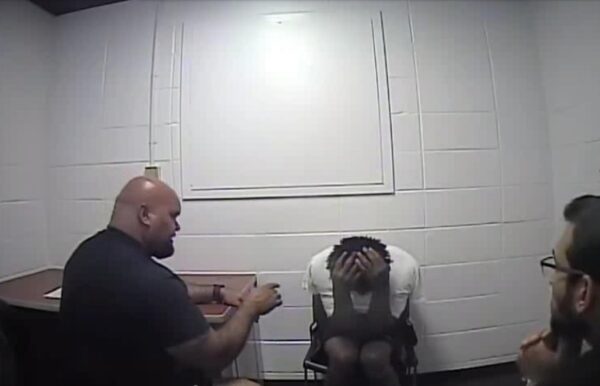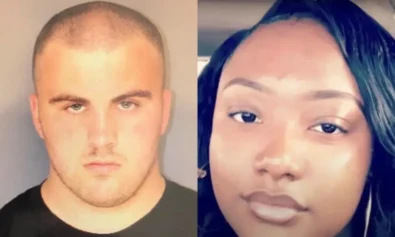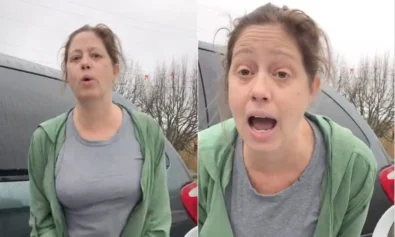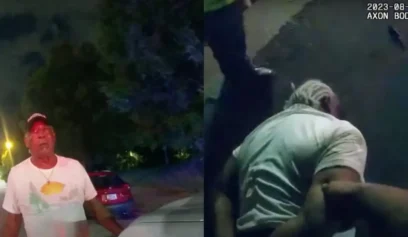A Chicago teenager alleges that detectives forced him to confess to a murder he did not commit and landed him in jail for over a year, according to a lawsuit obtained by Atlanta Black Star.
Corinthian “Corey” Burns was 15 years old in July 2018 when Waukegan detectives cornered him in an all-night interrogation. It ended with him being charged with second-degree murder and other offenses until they were later dismissed.
Burns filed a federal lawsuit on May 28 against the north Chicago suburb, Lake County and several current and former officials of the city and county, including detectives and prosecutors.

The lawsuit alleges the detectives questioned Burns for hours about a shooting at a car show. They did not promptly notify a parent or guardian that he was in custody, ignored his request for a lawyer, and the advocate who was supposed to protect the boy joined in the interrogation.
The complaint accuses the detectives of violating the teenager’s due process, fourth and fifth amendment rights, failure to intervene, infliction of emotional distress, civil conspiracy and conspiring to deprive him of his Constitutional Rights.
The lawsuit comes months after authorities released another teenager facing aggravated battery charges after confessing to shooting a store clerk. Martell Williams, 15, was freed in February after two days in custody once his family proved that he was 18 miles at a high school basketball game when the crime occurred.
“A good investigator can get an adult to say things that they did not do, especially over a long period of interrogating,” said former Waukegan Det. Larnell Farmer.
“If that kid confesses to killing Jimmy Hoffa, then we write that down [and] he must be guilty,” Farmer said. “All that juvenile wants to do is to get out of that room.”
Waukegan officers had accused Burns of shooting Daiyon Bolden, 19, who died on July 14, 2018, from the wounds he sustained when gunfire erupted at the annual Scoop the Loop event downtown. The crowd “dispersed in every direction,” the lawsuit says, so “the witnesses did not have ample time to view the suspect.”
Eyewitnesses gave conflicting descriptions of the suspects, but officers tapped Burns and his friend for the crime. They took him into custody as he and the friend were walking down a street about two blocks from the scene of the shooting at 11 p.m. and did not try to contact the boy’s parents for hours, the complaint says.
Interrogation video obtained by WBEZ Chicago reportedly shows a detective asking the boy if he would like an attorney and proceeding without one even though his advocate, Detective Jaroslaw Grzeda, was there.
“Grzeda never expresses any concern about interrogating a barely 15-year-old child beginning at 2:00 a.m.,” the lawsuit says. “Grzeda sat quietly in the room and watched idly as Corey’s constitutional rights were being violated.”
Grzeda later jumps in with his own series of questions during the interrogation of the minor.
The lawsuit alleges that the officers told Burns a slew of lies to coerce the confession out of him. They told him that they were in possession of footage showing him shooting a gun and that they found the murder weapon with his prints on it.
The detectives also told Burns that his best friend implicated him in the crime, and they found gunshot residue on his body. The lawsuit alleges that no weapon was discovered from the crime scene at the time.
One of the detectives, Domenic Cappelluti, had a reported track record of obtaining false confessions.
Cappelluti questioned Jerry Hobbs before he confessed to stabbing his daughter and her friend to death in 2005. Hobbs spent five years in jail before DNA evidence connected the murders to another man and the charges against him were dropped.
Cappelluti has been named in another lawsuit with the city in a 2009 case where Calvon Walker confessed to a murder so that he could call his family. His grandmother argued that he was not at the park where the killing happened, and prosecutors eventually dropped the charges.
“It was common that suspects interrogated in connection with investigations within the jurisdiction falsely confessed, under extreme duress and after suffering abuse, to committing crimes to which they had no connection and for which there was scant evidence to suggest that they were involved,” the complaint says.
Cappelluti, a veteran of the force, shares his expertise in criminal interrogation and homicide investigation and has testified as an expert witness in various states, according to the East Central Illinois Training Project.
However, it was Detective Andres Ulloa who got the boy to confess to the crimes. WBEZ reports that at 2:40 a.m. Ulloa pressured the boy into tears. Burns reportedly flinched and lowered his head into his hands 20 minutes to the hour. A little over an hour later, at 3:39 a.m., Burns gave up and said he fired the gun.
“Why didn’t you just tell me that from the beginning?” the detective asks.
“I just confessed to something I didn’t do,” the boy answers.
Both detectives are named in the lawsuit. The interrogation ended at 5:30 a.m., it says.
In addition to the murder charge, Burns was booked for aggravated battery and aggravated discharge of a firearm, according to court records. He spent 16 months in juvenile until a judge threw out the evidence and prosecutors dropped the charges.
“His mom thought it was a unique case until the Martell Williams case hit the airwaves this year,” said Kevin O’Connor, the family’s attorney. “They were afraid of stirring up trouble.”
Lake County State’s Attorney Eric Rinehart issued an apology after Martell was set free when his alibi was confirmed. But, like Burns, the officers did not let Martell speak to his mother or consult with an attorney, and his advocate also neglected him.
O’Connor, also the attorney in Martell’s case, said detectives told the boy he could go home in 10 minutes if he confessed to the crime.
“It was literally like watching a little kid who was a zombie, who was ready to answer whatever they told him,” O’Connor said, referring to the interrogation video. “It was a complete manipulation of a child. … He would have confessed to killing John F. Kennedy.”
Illinois Gov. JB Pritzker signed a law that took effect in January barring police from deceiving minors during interrogations. It blocks the confessions from being used in court, but it does not penalize the officers. Rinehart has also hosted training for the department on questioning minors.
A city attorney said in a statement that “the allegations in the complaint are just that, allegations, and they have not been proven to be true.”
“As a general rule, the city does not comment on matters that are in litigation,” the statement says. “The city is further restricted from making any substantive comments by the disclosure prohibitions contained in the Illinois Juvenile Court Act.”


